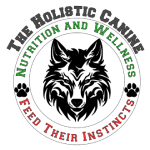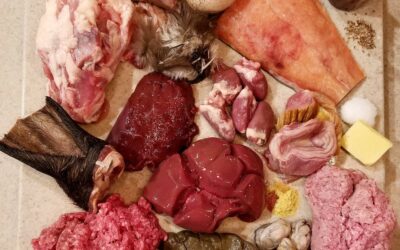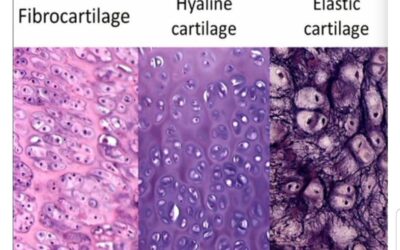Energy is Everything! Your Dog’s Life Depends On It
When it comes to fueling our canines’ bodies, there has to be the consideration of which foods are species-appropriate and which are not. Our dogs have very specific energy needs and nutrient requirements that must be supplied by the diet. This requires careful thought and planning. Energy and nutrients cannot come from just any food. The foods must be digestible, void of anti-nutrients that a dog cannot counter or neutralize, and have the correct cells and molecules that a dog’s digestive capabilities are designed to effortlessly and adequately breakdown to unlock potential energy and the nutritional components that are vital to health and life. These foods are what are known as species-appropriate. There are no other foods that need to be or should be added to the canine diet. Let’s discuss why that is imperative if your goal is to cultivate optimal health. Optimal health can only be realized with ideal nerve energy and peak cellular function.
Every biological organism and living being requires food. Food supplies the energy needed for metabolism. Quantum physics has shown us that energy is everything, everything is energy. Our dogs, like us, are energy beings. Energy, therefore, is first and foremost the most crucial factor in nourishing and sustaining the body. Physiological processes cannot be adequately maintained without the consistent supply of energy nourishment replete within species-appropriate foods. When food is not supplied, the body will utilize all stored potential energy located within the muscles and liver for basic metabolic functions and physical work (movement). This first fuel source is glycogen (in carnivores, amino acids are turned into a fuel source via a process known as gluconeogenesis). When glycogen is exhausted, the body then turns to stored body fat, a stored energy source. Fat is utilized by being converted into ketone bodies which are then burned as fuel. When fat stores deplete, the body will cannibalize itself to create an energy source by breaking down muscle and organ tissue to release amino acids that are then burned as fuel (again, via gluconeogenesis). Thus, potential energy is primary in maintaining metabolism and thus sustaining life. Potential energy must be supplied via adequate food intake for physiological processes to be optimal for the cultivation and maintenance of health. Any shortage of potential energy from food will result in the body drawing upon its own reserves. (Note, obese animals must be allowed to draw on stored body reserves for fuel in order to drop to an ideal body fat percentage; however, food intake must still be supplied to prevent malnourishment and fatigue.)
It is thus clear that energy is the foundation for everything to exist. Food for both our dogs and us revolves around energy. While food is also the vehicle for vital nutrients, it is the energy that fuels metabolism and bodily processes that allow for the breakdown and release of the nutrients that are necessary for further physiological function, maintenance, and repair. For optimal health to be realized and maintained, energy cannot be in short supply. And yet this is just what we are seeing in the modern canine as too many dogs are clearly suffering the ill effects. Understanding energy in the correct context is first necessary.
It is essential to recognize body energy in its two forms,
- potential energy that is produced within the mitochondria (cellular organelles where the biochemical processes of respiration and energy production occur), and
- nerve energy for the functioning powers of the body.
Food provides potential energy that is converted and burned (consumed) as fuel. Nerves control every part of the body including muscular action, digestion, functions of the organs, circulation, and emotions. The nerves are the grand conductors of motive power and sensory impulses. Having adequate energy for both metabolism and vital nerve function is the only way to ensure optimal health and vitality.
The holistic approach to nutrition looks for all possible sources of unnecessary energy expenditure (energy waste), most notably as a result of the diet, but also in every facet of dynamic life. The body will divert vital energy to the elimination of excessive toxin build-up (from both metabolic function and exposure via diet and environment) and to areas that require repair to damaged tissues caused by inappropriate, adulterated, and contaminated foods, excessive stress, chemical exposures, environment, and so forth. By removing these energy wasting sources, energy will be freed to allow for peak motive power available to the maintenance of optimal health, and most importantly, in crises when health is threatened by illness, injury, or trauma. This is the single most important detail for multiplying the likelihood for longevity.
Freeing-up your dog’s essential nerve energy is achieved by,
- providing a fresh raw species-appropriate diet (unadulterated and non-GMO) that is easily digestible, nutrient balanced (achieved by offering a variety of differing meals), and free from chemicals and naturally-occurring toxins and anti-nutrients,
- providing pure water that has been filtered via reverse osmosis,
- eliminating harmful chemical, toxin and stress exposure, and
- providing your dog with a safe environment complete with daily exercise in the fresh air and sunlight.
Let’s look at this another way. Excessive toxin build-up and tissue damage occur as a result of:
- inappropriate, processed, adulterated, contaminated, nutrient-deficient, nutrient-toxic, and anti-nutrient rich diets
- contaminated water consumption, especially tap water which contains fluoride, chlorine, heavy metals, pharmaceuticals, farming chemicals, flocculants, spores, cysts, and parasites
- environmental stress and chemical exposure
- physical stress and over-demand
- lack of exercise
- polluted indoor and outdoor air, lack of fresh clean air
- mental stress, anxiety, confinement, loneliness, and depression (YES, animals get depressed!)
- over-vaccination and the use of flea, tick, and heartworm chemicals and preventatives
- pharmaceutical drugs
- parasite infestation
In light of the above, it is not difficult to understand why providing only quality species-appropriate foods is vital to the adequate supply of potential metabolic energy and to assuring that ample nerve energy is available for all bodily functions and in the event of crisis. Because what you put into your dog’s body by way of food choices is so vitally important, I want to again stress what is not species-appropriate for a canine. Anything other than species-appropriate foods lead to motive energy shortage which may mean the deterioration of health and a decreased chance for longevity.
Foods that put a direct damper on overall energy output and nerve conduction are:
- processed commercial foods full of adulterated proteins, rendered fats, contaminants, and synthetic and inorganic nutrient isolates
- moisture-deficient dry kibble
- diets high in carbohydrates and insoluble fibers (dogs have absolutely no need for either of these)
- grains, legumes, nuts, and seeds (seeds may have some value if ground into a powder and if anti-nutrients are strategically counteracted)
- plant fats and diets high in plant-based proteins (especially legume and pea protein) or vegetarian diets
- vegetables that are fibrous and stalky, oxalate and lectin-rich, and from the deadly-nightshade group
- cooked proteins, fats, and carbohydrates
- raw fish containing heavy metal contaminants (as well as thiaminase)
- high sugar fruits and fruit fed in meals with protein. Protein needs an acid bath. When proteins are consumed alongside fruit, it can potentially turn fruit into an alcohol ferment creating a toxin that must be metabolized in the liver.
Any foods that create an unnecessary need for increased energy out-put reduces over-all available energy needed for the optimal functioning of organs, systems, and immunity and daily maintenance, repair, and toxin elimination from metabolic processes and stress. Species-inappropriate and contaminated foods create an undue need for toxin removal, cause or create an inflammatory response, create an increase in pancreatic enzyme out-put (grains, legumes, nuts, and seeds) and pancreatic hormone out-put (insulin in the presence of carbohydrates and sugars), tax and overburden the liver, dehydrate the cells, block or disrupt nutrient absorption via anti-nutrients (phytates, lectins, oxalates, thiaminase, insoluble fiber), create digestive difficulty and reduced nutrient assimilation, and are cause for indigestion, gassiness, constipation, diarrhea, increased mucous production, and the potential for bloat.
Energy is essential. In reality, it is everything. When energy is optimal, functioning is optimal. When we provide our dogs with species-appropriate foods that are easy to digest, nutrient uptake is also optimal and energy is abundant and reserved rather than wasted. Feeding your dog food that is inappropriate for convenience, simplicity, or for the mere reason that it contains a nutrient molecule that your dog requires is ineffective and futile. If energy and nutrients cannot be unlocked or assimilated and it further inhibits the absorption of other vital nutrients, where is the value? The truth is, there is no value. Let’s consider some examples.
Species-appropriate foods can only be of value to those species that are specifically designed to unlock the vital potential energy and nutrients within those foods. Grass contains a plethora of vitamins, minerals, and omega-3 fatty acids. Does this mean that grass is a suitable source of vitamins, minerals, and omega-3 fatty acids for a dog? Obviously no, and I am quite sure most of us know what happens when dogs eat grass. And yet grass is a vitally important food for grazing ungulates. Grass is species-appropriate food for cattle, horses, deer, and buffalo that are able to create massive bodies with rippling muscles and strong bones from grasses. Consider grains. Grains contain very few nutrients, but are rich in anti-predation chemicals and toxins that are counter-productive to health. Do grains contain any useable nutrients for carnivores such as canines? In their raw natural state they are deadly. The only known species created for grain consumption are birds which have the correct digestive capacity to counter the anti-nutrients and natural toxins while also breaking down the tough cell walls in their gizzard. Since dogs, like ALL other animals, are designed to consume their food in a raw state, grains are not, therefore, species-appropriate. But what if grains were allowed to ferment or sprout, were subjected to milling, cooking, and more cooking? Would these be appropriate even then? According to the National Research Counsil (NRC) as recorded in their massive research compilation Nutrient Requirements of Dogs and Cats, the holy grail of canine nutrition research, “there appears to be no requirement for digestible carbohydrate in dogs provided enough protein is given to supply the precursors for glucogenesis.”
Despite these above facts, man feels the need to offer their beloved canines these inappropriate foods, including feeding foods that are cooked. No other animal, besides man, consumes cooked foods. Dr. Francis M. Pottinger’s cat study [1, 2] speaks volumes as to this massive error made by man. Dogs are not people…period. (Sometimes our dogs may feel like our children, but they are not our species!) The results of this error is clearly realized by the chronic ailments afflicting the modern dog, ailments they share with their human companions. Diabetes, joint destruction and arthritis, obesity, heart disease, macular degeneration, cancer and more are common among nearly every breed. Coincidence? Hardly.
What are species-appropriate foods for your dog? Whole raw prey or fresh raw meat, raw meaty bones, organs, offal, and very little, if any, plant material. Providing your beloved canine with a diet that is perfectly suited for their anatomy and physiology is the first step in providing nourishment that effectively and almost effortlessly delivers the vital potential energy and thereby the vital nutrients that are perfectly intended to flawlessly sustain life and, above all else, cultivate the coveted optimal health and longevity that we likely all desire for our beloved pets. Energy is everything…and not to be squandered and wasted.
©2019 Kimberly Lloyd, PhD, BCHHP, Cert Raw Dog Food Nutritionist
[1] https://www.westonaprice.org/health-topics/nutrition-greats/francis-m-pottenger-md/
[2] https://www.amazon.com/Pottengers-Cats-Francis-Marion-Pottenger/dp/0916764060/ref=sr_1_fkmrnull_1?crid=Q4TXFN7EUE4T&keywords=dr+pottinger+cat+study&qid=1551383777&s=gateway&sprefix=Dr+pottinger%2Caps%2C146&sr=8-1-fkmrnull



